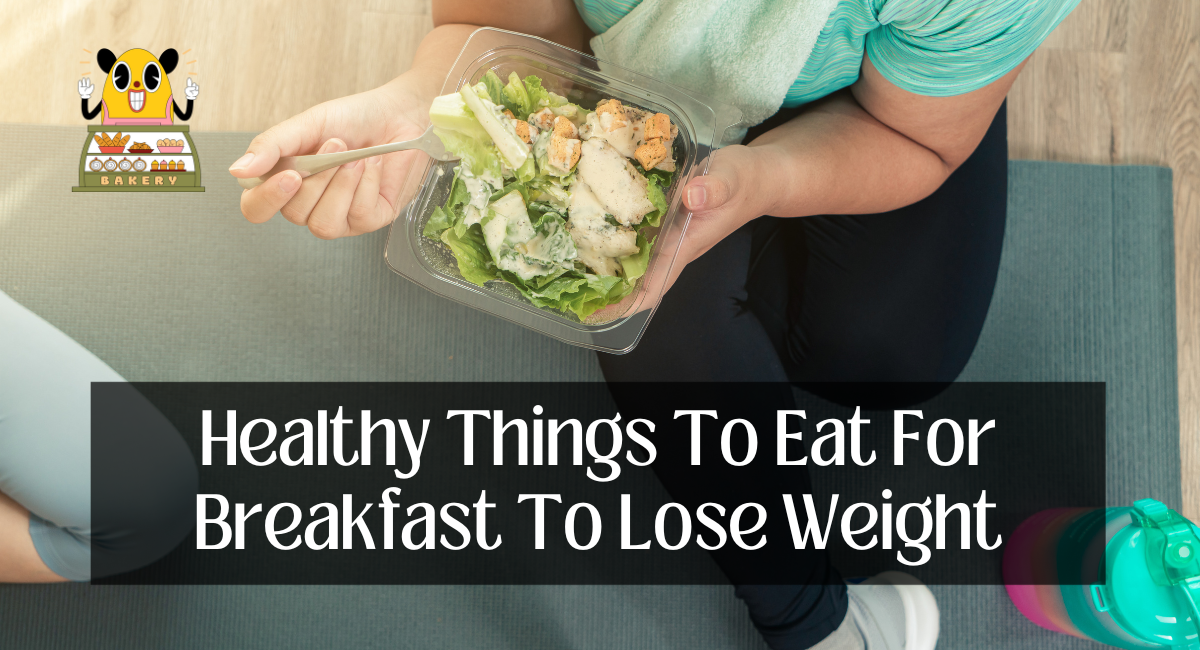Are you attempting weight loss? Consuming fewer calories and preceding breakfast is the easiest way to lose weight. However, skipping breakfast can be detrimental to your weight loss plan, as it can contribute to hunger and overeating.
Therefore, eating a nutritious breakfast can help you lose weight by keeping you energized and full throughout the day. Preparing a healthy brunch can be difficult and often requires considerable effort. In this article, we will explore healthy things to eat for breakfast to lose weight.
Healthy Things To Eat For Breakfast To Lose Weight
1. Oatmeal
For individuals trying to lose weight, oatmeal is a popular breakfast option. It is a fiber-rich whole grain that will keep you feeling full and satisfied for longer. To avoid extra carbohydrates, choose plain, steel-cut, or rolled oats over instant types. You may make your oatmeal more nutritious by adding antioxidant-, vitamin-, and naturally tasty fresh fruit like blueberries or strawberries. Bananas and nuts provide healthy fats and textures. A touch of honey or cinnamon provides flavor without adding too much sugar.
2. Greek Yogurt
Greek yogurt is a protein powerhouse, and protein is important for weight loss because it contributes to satiety and helps maintain lean muscle mass. Opt for basic, non-fat, or low-fat Greek yogurt to minimize added sugars. Add crunch with almonds and seeds, such as chia or flax seeds, and top with various fruits for vitamins and fiber. A drizzle of honey can sweeten a dish.
3. Eggs
Eggs are a good source of both protein and healthful fats. They offer vital nutrients such as choline, which promotes cognitive health. The variety of egg preparations, including scrambled, poached, boiled, and omelet, keeps breakfast intriguing. Including vegetables such as spinach, bell peppers, and tomatoes increases the meal’s fiber content and overall nutrition.
4. Smoothies
Smoothies provide a versatile medium for delivering nutrients. Blend a variety of nutritious and naturally sweet fruits. Including protein sources such as Greek yogurt, cottage cheese, or a plant-based protein supplement aids in appetite control. Include verdant greens, such as spinach and kale, which contribute fiber, vitamins, and minerals. Choose a liquid base for the desirable consistency, such as water, almond milk, or coconut water.
5. Whole Grain Toasted Bread
Whole grains are abundant in fiber, which aids digestion and contributes to satiety. Toast made with whole grains can serve as a canvas for numerous garnishes. Avocado purée provides healthful fats and a creamy texture. Adding a poached egg or almond butter increases the breakfast’s protein content, making it more filling.
6. Cream Cheese
Cottage cheese is an additional protein-rich food. Additionally, it is minimal in calories and contains calcium for bone health. Combining it with pineapple or mangoes adds natural sweetness and nutrients. Sprinkle on nuts or seeds, such as sunflower seeds or sliced almonds, for a nutrient boost.
7. Chia Pudding
Omega-3 fatty acids, fiber, and antioxidants are abundant in chia seeds. When immersed in liquid, they develop a gel-like consistency ideal for making pudding. A nutritious base is produced by combining chia seeds with milk and allowing them to marinate overnight. For added flavor, garnish with fruits, almonds, and a drizzle of honey.
8. Whole Grain Cereal
Choose cereals high in fiber, low in sugar, and derived from whole grains. Fiber aids digestion and assists in appetite control. The addition of low-fat milk or a dairy-free alternative provides protein and calcium. Vitamin-rich and naturally delicious fresh fruits complete a well-balanced breakfast.
9. Quinoa Breakfast Bowl
Quinoa is a whole-protein source that contains all 9 essential amino acids. It delivers sustained energy and protein for the morning when used as the base of a cereal bowl. It’s topped with fruits like mixed berries, while nuts and seeds give texture. The dish is finished with a drizzle of honey or a drop of milk.
10. Vegetable Omelette
This breakfast is highlighted by eggs, which provide protein and essential nutrients. Incorporating colorful vegetables into your omelet provides vitamins, minerals, and fiber. Popular options include spinach, mushrooms, bell peppers, and tomatoes. A small amount of cheese, such as feta or goat cheese, improves flavor without adding excessive calories.
Tips
1. High-protein foods –
If you are sincere about losing weight, add more proteins than carbohydrates to your diet. A high-protein diet reduces your appetite and gives you a longer-lasting sense of fullness. In contrast, carbohydrate-heavy diets, such as sugary foods, can cause recurring hunger.
2. Concentrate On A High-Fiber Diet
Another essential component of a weight loss regimen is fibers. Additionally, it suppresses your appetite and cravings. The recommended daily fiber intake for weight loss is 30-35 grams. Fiber foods such as almonds, lentils, fruits, and certain vegetables like broccoli may help you achieve your objective.
3. Limit Refined Sugar
If you want to lose weight, you should cut back on how much processed sugar you eat. Foods with pure sugar only give you calories and none of the nutrients you need. You can eat less calories if you cut out sugar from your diet. Add apples and dates to your diet to satisfy your sweet tooth.
4. Diet Low In Carbohydrates
You do not need to eliminate all carbohydrates from your diet. Add low-carbohydrate foods such as cereals and wheat toast to your diet to control your blood sugar and insulin levels.
5. Eat In Harmony
Eating in a hurry and without concentration can result in excess. Eating attentively is essential for regulating your metabolism and excretion by your body.
Benefits
Eating a nutritious breakfast provides various benefits to your overall health and weight loss objectives when attempting to lose weight. Here are the primary advantages of including these healthy options in your morning routine:
1. Fullness And Appetite Suppression
Nutrient-dense breakfast options, such as those high in protein, fiber, and healthy fats, make you feel satiated for longer. This decreases the likelihood of later day overeating or grazing on unhealthy foods. It has been demonstrated that protein, in particular, has a strong satiating effect, helping to suppress cravings and manage appetite.
2. Balanced Intake of Nutrients
The essential macronutrients carbohydrates, protein, and fats are present in a balanced proportion in a nutritious diet. This nutrient balance promotes consistent energy levels and prevents energy crashes, mood fluctuations, and sugar cravings.
3. Enhancement of the Metabolic Rate
Eating a nutrient-dense breakfast in the morning increases your metabolism, allowing your body to expend calories more efficiently throughout the day. Your metabolism can decrease when you forego breakfast or consume high-calorie, high-sugar foods.
4. Maintenance of Lean Muscle Mass
Breakfasts high in protein, such as those containing eggs, Greek yogurt, or cottage cheese, promote the maintenance and growth of lean muscle mass. Maintaining muscle mass during weight loss is essential for a healthy metabolism and stamina.
5. Dietary Intake
Numerous nutritious breakfast alternatives are rich in vitamins, minerals, and antioxidants. Contributing to your daily nutrient intake, fruits, vegetables, whole cereals, and nuts promote optimal health and reduce the risk of nutrient deficiencies.
6. Stable Blood Glucose Levels
Complex carbohydrates, such as those found in whole grains, oats, and fruits, are digested slowly, resulting in a gradual and constant release of glucose into the bloodstream. This helps prevent blood sugar surges and crashes, reducing the desire for sugary snacks.
7. Cardiac Health
Heart-healthy nutrients, such as fiber, omega-3 fatty acids, and antioxidants, are abundant in heart-healthy breakfast options, such as cereals, nuts, and fruits. These nutrients promote cardiovascular health by lowering inflammation, cholesterol, and blood pressure.
8. Enhanced Digestion
Breakfast options high in fiber, such as oatmeal, chia seeds, and whole grains, promote healthy digestion by preventing constipation and promoting regular digestive movements.
9. Conscious Eating Practices
A nutritious breakfast in the morning establishes a positive tone for the remainder of the day. It promotes mindful eating and heightened awareness of your body’s hunger and satiety indicators.
10. Long-Term Weight Control
Incorporating a nutritious and well-balanced breakfast into your daily routine can improve your long-term adherence to healthy eating patterns. Your consistency in making nutritional food choices supports your long-term weight management objectives.
Thanks for reading.

